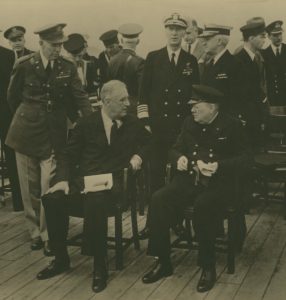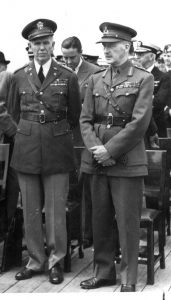On the evening of July 30, 1941, General George C. Marshall, chief of staff of the United States Army, was suddenly called to the White House. When Marshall arrived, he was directed by President Franklin D. Roosevelt to prepare, in secrecy, for a meeting at sea with British Prime Minister Winston Churchill and his military advisers. The secrecy of the meeting was so vital that Marshall was only permitted to have General Henry H. Arnold, chief of the Army Air Forces, and two other assistants accompany him, and these three men did not know where they were going until they were well on their way to their destination.
The secrecy of the meeting was so vital that Marshall was only permitted to have General Henry H. Arnold, chief of the Army Air Forces, and two other assistants accompany him, and these three men did not know where they were going until they were well on their way to their destination.
General Marshall and Admiral Harold R. Stark, chief of naval operations, boarded the heavy cruiser U.S.S. Augusta in New York on August 3, 1941. The ship anchored in Placentia Bay, near the United States base at Argentia, Newfoundland on August 7th. The H.M.S. Prince of Wales, which was carrying Churchill and his military advisers, arrived on the morning of August 9th.
As the United States was not yet an active participant in World War II, the issues that were discussed at the conference were fairly broad in nature. When recalling the conference to his biographer Dr. Forrest C. Pogue, Marshall noted, “the meeting was largely a get-together for the first time, an opportunity to meet the British chiefs of staff, and to come to some understanding with them as to how they worked and what their principal problems were. We were in no position at that time to lay very heavy matters before them.”
In preparation for the meeting, the British service chiefs had prepared a “Grand Strategy Review,” which outlined in some detail the ways in which the United States could aid the Allied war effort. The British officers were hopeful that the document  they presented to the American officers and the subsequent discussions during the conference would convince the Americans of the immediate importance of their intervention in the war. General Marshall and Admiral Stark indicated their support for increased cooperation with the Allies but also warned that over-committing American resources would severely undermine the future mobilization efforts of America’s armed forces.
they presented to the American officers and the subsequent discussions during the conference would convince the Americans of the immediate importance of their intervention in the war. General Marshall and Admiral Stark indicated their support for increased cooperation with the Allies but also warned that over-committing American resources would severely undermine the future mobilization efforts of America’s armed forces.
Although the outcome of the Atlantic Conference was not what the British had hoped for, it resulted in greater coordination of supplies between the British and Americans and produced a declaration of peace aims called the Atlantic Charter. The conference had also served to establish and strengthen personal relationships between British and American leaders, particularly the two chiefs of staff Sir John Dill and General George C. Marshall who formed a friendship that was of great importance to Anglo-American relations during the war.
